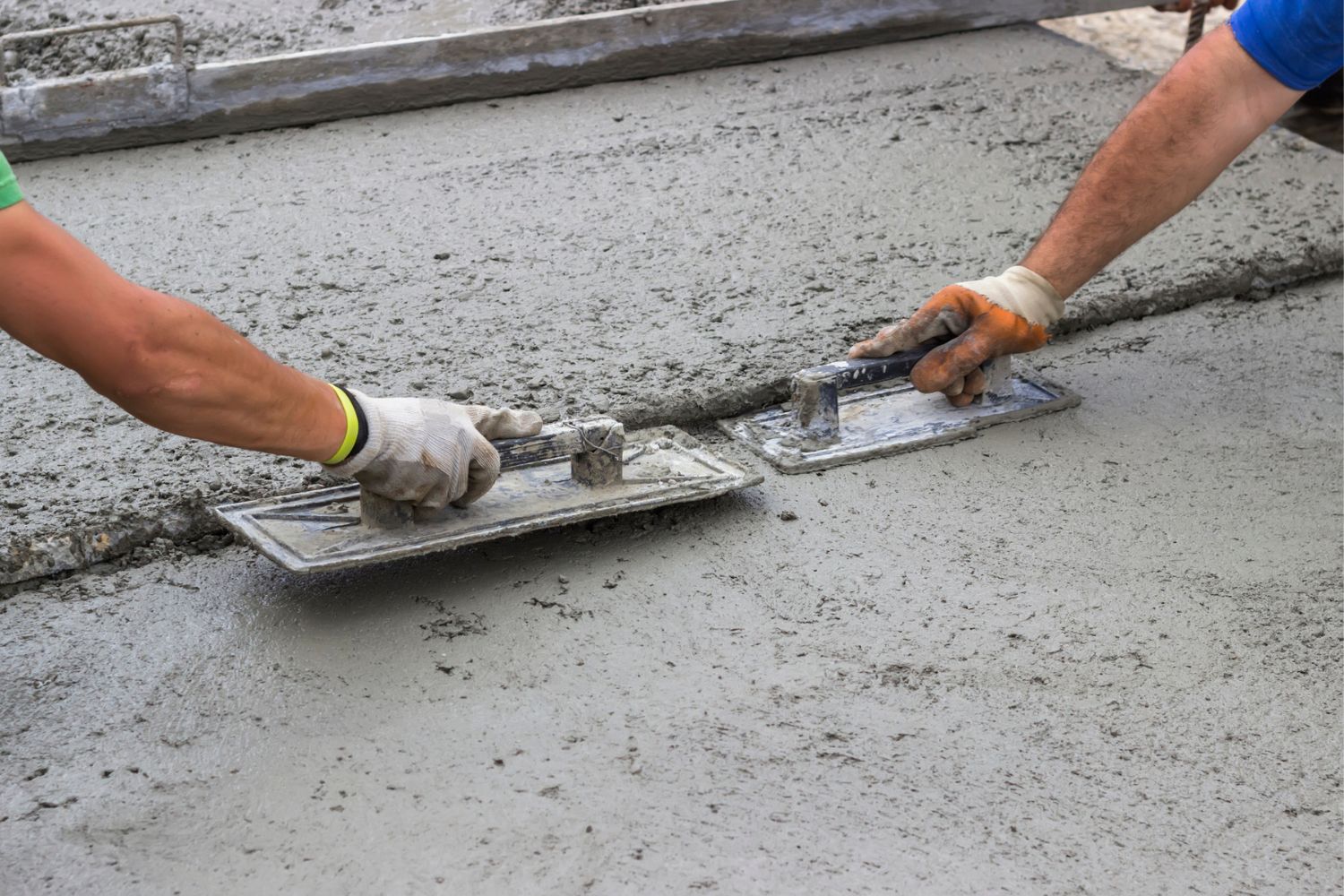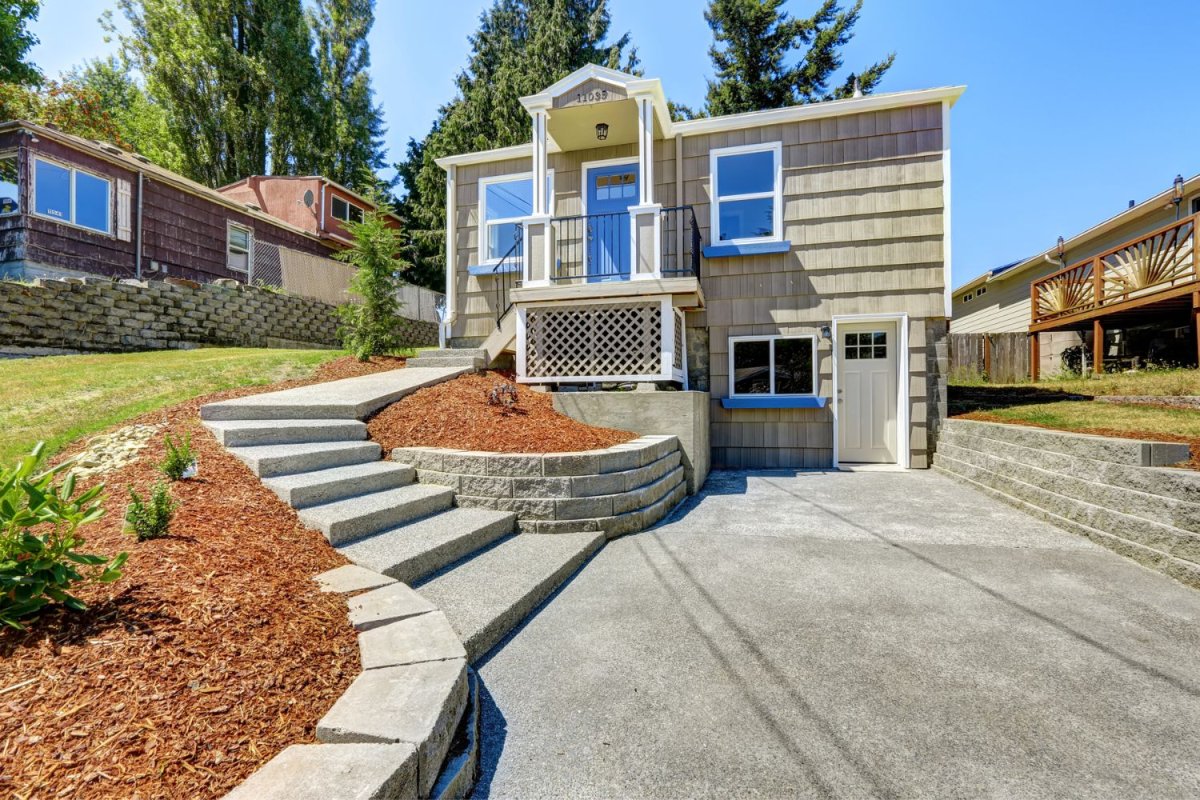We may earn revenue from the products available on this page and participate in affiliate programs. Learn More ›
When it comes to choosing between pavers vs. concrete, there are several factors for homeowners to think about before making a decision. The first (and, for many, most significant) factor to consider is budget. If a homeowner has a set amount to spend on a project that doesn’t leave room for flexibility, it may be tempting to use the cheapest material available. However, it’s also important for homeowners to think about the long-term consequences of the chosen material and what maintenance it might require in the future.
Generally, the cost of a concrete driveway is less than the cost of pavers for a driveway. But if the driveway sees a lot of wear and tear, major cracks can occur that will call for repairs, which aren’t cheap. Paver driveway costs may be higher up front, but it will be easier to keep this material in tip-top shape as time goes on. Likewise, concrete patio costs may be lower up front than paver patio costs, but the material could show more wear and tear if it sees frequent tread. It’s also worth homeowners considering which type of material would be better for resale value in the event that the home is sold in the future. Each material has its pros and cons, and homeowners will want to understand every cost factor that could arise when deciding between the two.
1. The up-front cost of paving stones is 10 to 15 percent more expensive than concrete.
Paver installation cost is higher than the cost of installing concrete. But what are pavers, exactly? They are blocks, stones, or bricks used to cover an outdoor area, such as a driveway or a patio. While individual pavers aren’t expensive when compared with concrete costs per yard, laying pavers is more time- and labor-intensive than pouring concrete. As a result, installing a concrete driveway costs a bit less than the cost to pave a driveway by putting in driveway paver stones. The up-front cost of pavers can run anywhere from $8 to $50 per square foot, while concrete runs about $4 to $30 per square foot. If the budget is on the lower end, concrete may be the best option for getting the project completed in the near future—homeowners will just want to bear in mind that it may eventually be necessary to set aside funds for maintenance and repairs.
| Project Type | Average Cost (Materials and Labor) |
| Concrete driveway | $2,340 to $7,500 |
| Concrete patio | $1,768 to $4,828 |
| Paver driveway | $2,500 to $6,600 |
| Paver patio | $2,400 to $7,000 |
2. Poured concrete is the most cost-effective material per square foot, but the price can go up with added colors or patterns.
Having one of the best driveway paving companies pour a basic concrete surface can start at about $4 per square foot, but that price will increase with the addition of accents such as colors or designs. Stamped concrete, for example, is a popular option since it provides a more pleasing aesthetic. It can be made to look like wood or stone at a fraction of the cost of those materials. A basic stamped concrete design can start at $5 per square foot and go up to $18 per square foot for more complex designs. Staining concrete involves adding pigments to transform a plain gray concrete surface into a more exciting and colorful one. Stained concrete costs between $5 and $20 per square foot. Additional enhancements include brushing, painting, stenciling, engraving, or pebbling. Generally, concrete enhancements can add an extra $1 to $20 per square foot to the cost of concrete, so the price could be comparable to pavers with the addition of many customizations. To take the cost of stamped concrete vs. pavers as an example, stamped concrete patio costs start at $5 per square foot but pavers will cost at least $8 per square foot without any customizations.
| Concrete Finish Type | Driveway Cost per Square Foot (Materials and Labor) | Patio Cost per Square Foot (Materials and Labor) |
| Broom finished | $8 to $12 | $4 to $7 |
| Exposed aggregate | $8 to $12 | $2 to $3 |
| Polished | $8 to $12 | $3 to $10 |
| Stained | $18 to $20 | $5 to $10 |
| Stamped | $12 to $18 | $5 to $15 |

3. The cost of pavers will also depend on the material, with some being lower-cost than others.
Pavers come in several different materials, with the most common being concrete, brick, natural stone, and porcelain. Many options can be customized for homeowners who have unique driveway paver ideas they would like to incorporate into the design. Concrete is one of the lowest-cost options ranging from $8 to $15 per square foot after installation. A concrete paver patio or driveway can also be customized with colors or textures for an additional cost. Brick pavers have a slightly higher cost range of $10 to $20 per square foot. While some prefer the look of brick to concrete, this material is more prone to damage. Natural stone is one of the costliest options at $15 to $50 per square foot, but it can fit in with a variety of home styles. Flagstone patios cost around $15 to $30 per square foot and are a popular stone paver option. Porcelain pavers are durable and relatively low maintenance compared to other paver materials. This option costs $3 to $35 per square foot, with unglazed being the most budget-friendly and polished porcelain being the most expensive.
| Paver Type | Average Cost per Square Foot (Materials and Installation) |
| Concrete pavers | $8 to $15 |
| Brick | $10 to $20 |
| Natural stone | $15 to $50 |
| Porcelain | $3 to $35 |
4. Paving stones are more durable than concrete and can withstand more pressure per square inch, which results in lower costs over time.
Whether a homeowner uses cement pavers or wants stone driveway paving, paving bricks and stones are typically stronger than concrete and can hold more weight on the surface before a crack shows up. Most pavers can withstand up to four times as much pressure as concrete. (And for those wondering about the strength of an asphalt vs. concrete driveway, concrete is the more durable of the two.)
It’s also worth factoring in durability when considering pavers vs. concrete costs. Pavers are generally easier and cheaper to repair and replace than concrete. If an individual brick or stone is loose or damaged, it’s easy to replace it without affecting the rest of the bunch. However, if the paver patio has a complex design and several pavers are damaged, it may be a good idea for the homeowner to contact a professional to make the repairs.
5. Concrete will require more repairs over time than pavers, which will add to the overall cost of ownership.
While the less expensive price tag of concrete may seem appealing, it comes with a downside. Concrete slabs for patios, driveways, or other spaces aren’t as durable as pavers. Without proper concrete maintenance, these surfaces are likely to crack, stain, and shift over time. These changes can also cause drainage issues in the yard, which can result in another hefty bill. Installing a drainage system in a backyard costs an average of $4,340, but the price could go as high as $18,000 if major drainage problems need to be addressed. For this reason, it’s worth homeowners budgeting for patio or driveway repair costs when deciding between installing pavers and concrete.
A power washer can sometimes do the trick when it comes to stains, but some stains may not disappear altogether. A homeowner’s options would be to live with the stains or replace that section of concrete. Repairing concrete is also more laborious than replacing a few individual pavers since a professional will likely have to tear out a significant portion and pour replacement concrete. This requires more time, materials, and money than repairing a few stones. Small, superficial cracks can be fixed with a synthetic sealant at a cost of $0.10 to $0.15 per linear foot. Minor concrete cracks can cost as little as $300 to repair, but the bill could skyrocket if there is significant damage.

6. Both concrete and pavers require maintenance like cleaning and sealing, each of which come at a cost.
No matter which material a homeowner chooses, concrete and pavers will both need to be protected to withstand the elements. Over time, UV rays and other elements can fade the look of concrete and pavers, so sealants help protect them from discoloration. After the concrete is poured or pavers are put down, they will need to be sealed to extend their life and keep them looking their best. A wide range of sealants are available, and it’s a job most homeowners can do themselves; however, a professional will take less time and ensure the job is done correctly. Sealing pavers or concrete requires special equipment and protective gear because coming into contact with the substance can potentially be hazardous. Driveway sealing costs will ultimately depend on the material, but the national average cost is $486. The good news is that once the driveway or patio is sealed, it will only need to be resealed every few years as added insurance. Concrete and pavers will also need to be cleaned before they’re resealed. Cleaning and sealing concrete costs about $1.50 per square foot, and cleaning and sealing pavers costs about $2 per square foot.
Seasonal power washing is an important part of both concrete and paver maintenance. It’s an easy, safe way to remove buildup and debris that have settled on top of the driveway or patio. For those who don’t own a power washer, most hardware stores offer them as rentals for a block of time, usually about $50 per day. Otherwise, hiring a professional to pressure wash a driveway costs between $100 and $500.
7. Pavers and concrete can deliver similar returns on investment—what matters is how they’re used.
For homeowners who plan to sell their house in the future, the resale value of the home is an important part of all home improvement decisions. Ultimately, what’s most important when comparing concrete vs. pavers is how they’re used. A well-maintained concrete patio that’s placed well and complements the rest of the backyard will deliver more value than a paver walkway that’s covered in moss and missing bricks. Similarly, the simple classic design of a paver driveway may provide more value than a stained and stamped concrete driveway that doesn’t blend with the rest of the home’s exterior. Bottom line: If resale value is a consideration, small changes to outdoor areas can have a significant impact if they create a better flow or add to the home’s visual appeal.


